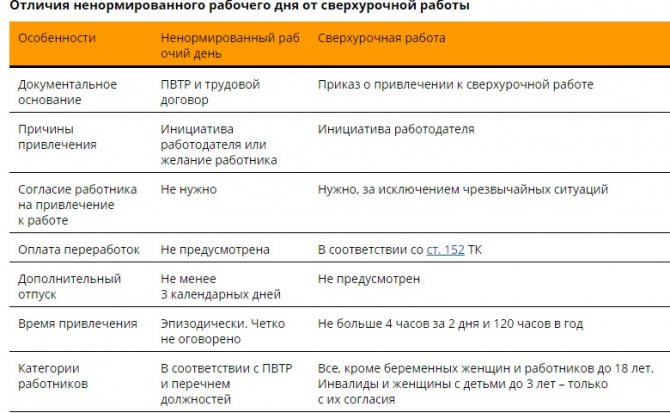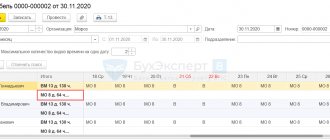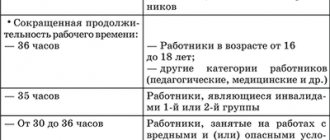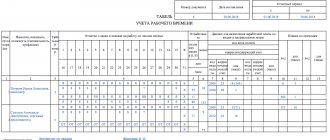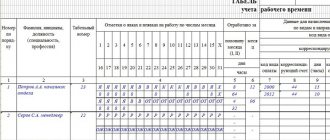General information
According to Art.
101 of the Labor Code of the Russian Federation, an irregular working day is a special labor regime in which some company employees are periodically called upon to perform their duties after the end of a standard working day by order of management. In this case, an agreement from the employee for this schedule is not required, since the conditions for irregular work are prescribed in the employment contract. Recycling can only be used in important, urgent and emergency cases and should not be done regularly.
General provisions
In accordance with Art. 97 of the Labor Code, the employer has the right to involve an employee in carrying out production tasks beyond the duration of the work shift established for him. The law stipulates 2 cases when this is permissible. Firstly, the employer can hire an employee to perform overtime work (Article 99 of the Labor Code), and secondly, if the employee works during irregular hours (Article 101 of the Code). The last case is the most difficult in practice.
List of positions for special labor regime
The head of the company must approve the list of positions for employees with irregular work schedules, after which the data should be recorded in the internal regulations of the institution.
The employer may include the following personnel in such positions:
- Engaged in economic, administrative and technical activities.
- Working on a flexible work schedule.
- The hours of work of which cannot be calculated accurately (for example, sales agents, realtors).
According to Art. 101, and the Labor Code of Russia, it is impossible to establish a similar work schedule for the following group of people:
- Pregnant and minors.
- Single fathers and mothers.
- Employees who are simultaneously studying at the university.
- Guardians of children under the age of majority.
- Those with disabilities.
- Women with children under 3 years old.
Algorithm for introducing a schedule into the activities of organizations
- Determination of positions for irregular work and their approval in the legal acts of the organization (work schedule rules, collective labor agreement).
- Familiarization of employees with the new work schedule with signature. The founder must notify about changes in the rules in the employment contract no later than 2 months in advance. In this case, additional agreements must be attached to employment contracts.
- Notifying the employee about the need for irregular work (if necessary). The form of notification is not defined by law, therefore it is possible both oral and written. To avoid disputes and disagreements between management and subordinates, it is better to use the latter method of presentation.
- Development of a legal document that will indicate overtime hours.
The founder must notify about changes in the rules in the employment contract no later than 2 months in advance.
Employer Responsibilities
The employee does not always agree to change his schedule. If an employee refuses to work during irregular hours, the employer must offer him in writing another vacant position that meets his qualifications, a lower position, or a job that pays less, taking into account the employee’s health condition. If such a position or work does not exist at the enterprise, in accordance with Part 1 of Article 77 of the Labor Code, the employment contract is terminated.
Features of the work schedule
How much overtime can you work with an irregular schedule? The maximum number of overtime hours is not determined by labor legislation. Engaging employees outside of working hours can occur both before and after the standard work schedule. The only requirement that the law puts forward for managers is the absence of systematic overtime. If overtime becomes constant, the employee can complain, including to the prosecutor's office. The organization is awaiting trial.
Compensation for overtime includes providing the employee with additional paid leave (at least 3 calendar days), the duration of which depends on the employee’s position, the amount of workload and the amount of work done during overtime.
It should be remembered that even if the employee is not involved in irregular work, he is entitled to additional vacation days.
Institutions have the right to independently introduce an additional method of compensating for overtime, recording it in the company’s documents.
It is possible to exchange vacation for financial compensation at the request of the employee. However, payment of overtime hours with such a schedule is not regulated by law, so the head of the organization may well refuse such an exchange by sending a colleague on legal leave.
Work at night, on weekends and holidays
Let us briefly consider how irregular working hours are paid in such cases. First of all, it should be noted that the involvement of employees in work at night, on a holiday or a day off, regardless of the regime, is carried out in compliance with the requirements established by the Labor Code. In particular, the provisions of Article 113 of the Code apply. According to the norm, it is necessary:
- Obtain the employee's consent in writing.
- Take into account the opinion of the elected body of the trade union.
- Notify the employee of the right to refuse work upon signature.
- Issue an order.
In addition, the employer must take into account the employee’s health condition. If the latter has contraindications, involvement in overtime work is not allowed.
As for payment, the double rate is due:
- Piece workers. Double piece rates are used in the calculations.
- Persons whose work is paid at hourly (daily) rates. For them, the calculation is made using a double rate.
- Salaried employees. They make a calculation in the amount of no less than a single rate (hourly or daily) in addition to the salary if the subject worked within the monthly norm, and if in excess of it - in the amount of a double rate.
As for working at night, even with an irregular schedule it is recognized as a deviation from the norm. Consequently, involvement in night work is paid at an increased rate - at least 20% is added to the salary (rate).
Difference of concepts
The terms “overtime” and “irregular working hours” are often confused.
The differences between these concepts are that an irregular work schedule has an episodic frequency of overtime and does not limit it in time, while overtime work involves overtime of no more than 120 hours per year and 4 hours in 2 days without a break.
Compensation for irregular work schedules is provided in the form of additional paid leave. In another case, overtime work is paid or time off is given.
The employee’s consent to an irregular work schedule is not required, but changes are prescribed in the employment contract. Overtime work during irregular working hours, on the contrary, does not require instructions in the employment contract, but requires mandatory consent to such a work schedule.
Controversial point
In some cases, employees, believing that they have worked a lot (for example, performed production tasks beyond the normal duration of the shift every day for a month), ask the employer for an additional paid day of rest. Of course, their desire is quite understandable. Employees believed that they would only overwork occasionally, but they were constantly involved. However, overtime hours under irregular hours are not equal to overtime hours. In the latter case, the employee has the opportunity to choose either monetary compensation or additional rest (Article 152 of the Labor Code of the Russian Federation). For an irregular schedule, only one compensation is established by law - vacation. Accordingly, the employer may not satisfy the request for an additional paid day of rest.
Subtleties of the work schedule
- The manager does not have the right to attract employees with irregular hours to perform duties that are not within the scope of their usual activities.
- It is prohibited to introduce irregular working hours for the entire team of the company.
- Weekends and holidays are non-working days for employees with irregular schedules. Involving them to work on such days is accompanied by additional payment (unless such working conditions are specified in the contract).
- If the labor inspectorate establishes regular overtime at the company, the manager will be punished in the form of a mandatory fine. In addition, he may be required to pay for overtime hours as overtime.
The head of the company and his subordinates are obliged to know their rights when introducing an irregular work schedule into their activities. Thus, knowledge of rights and laws will help to avoid abuse of official duties on the part of the founder and failure to fulfill legal obligations on the part of his employees.
Irregular working hours and overtime work
Hello! Let's understand the intricacies of overtime and irregular working hours.
According to Part 1 of Article 99 of the Labor Code of the Russian Federation, overtime work
- work performed by an employee at the initiative of the employer outside the working hours established for the employee: daily work (shift), and in the case of cumulative accounting of working hours - in excess of the normal number of working hours for the accounting period. The employer's involvement of an employee in overtime work with his written consent or without his consent is also given in Art. 99 Labor Code of the Russian Federation. The duration of overtime work should not exceed 4 hours for each employee for two consecutive days and 120 hours per year.
According to Art. 152 of the Labor Code of the Russian Federation, overtime work is paid for the first two hours of work at least one and a half times the rate, for subsequent hours - at least double the rate. Specific amounts of payment for overtime work may be determined by a collective agreement, local regulations or an employment contract. At the request of the employee, overtime work, instead of increased pay, can be compensated by providing additional rest time, but not less than the time worked overtime.
According to Art. 101 Labor Code of the Russian Federation irregular working hours
(hereinafter referred to as NSD) is a special work regime, according to which individual employees may, by order of the employer, if necessary, be occasionally involved in the performance of their labor functions outside the working hours established for them.
The list of positions with NSD must be enshrined in the organization’s collective agreement or other internal local act, which must also reflect the duration of additional leave (either the same for all employees, or different periods for each position). Art. 119 of the Labor Code of the Russian Federation provides that additional leave for NSD cannot be less than three k.d. The Labor Code does not limit the choice of the employer: he has the right to determine the categories of employees for whom such a work regime can be established.
The law does not explain how often workers can be hired and does not define the concept of “occasionally.” The courts believe that even if an employee overworks daily, this is justified by the NRM regime (appeal ruling of the Krasnoyarsk Regional Court dated 09/19/2012 in case No. 33-8174/2012 and appeal ruling of the Supreme Court of the Republic of Buryatia dated 04/09/2012 in case No. 33-742) . However, it is wrong to involve employees in constant overtime, since according to the law, irregular working hours imply an irregular nature. There are employers who are confident that if an employee has such a work schedule, he must sit at work from 8.00 to 00.00. This is mistake.
The Labor Code of the Russian Federation does not recognize overtime under the NWP regime as overtime work, in which certain guarantees must be observed (for example, limiting overtime hours, additional payment), and Art. 97 of the Code, which distinguishes the possibility of overtime into two cases (for overtime work; for work in conditions of irregular working hours), actually confirms this. The provisions of the Labor Code of the Russian Federation regulating NSD do not establish restrictions on the duration of work outside the working hours. The specificity of NSD is that an employee in the NSD mode can be involved in the performance of his labor functions, both before the start of the working day (shift) and after the end of the working day (shift), and the number of hours for which the employee is involved is not established and the employee is not paid for additional hours of work (as with overtime work), because he is granted additional days of leave for NSD. Many workers believe that if they have an NWP, they can start work later than the established start of the working day, for example, by a couple of hours, believing that being late is acceptable, since in previous days there were delays at work after its formal end. And if they were often late, they demand paid time off, indicating that they already worked too much, and significantly. However, under NSD, employees do not have such rights, NSD does not establish a flexible work schedule, they, like other employees, are subject to the working hours of the organization. The employer can safely apply disciplinary liability to such employees for violating labor discipline.
If an employee voluntarily works after the end of the working day, then this is not overtime work and there is no need to compensate for it (letter of Rostrud dated December 2, 2009 No. 3567-6-1).
The employee filed a lawsuit to declare the disciplinary sanction illegal. He was reprimanded for being 25 minutes late for work. The employee believed that there could be no delay, since he had an irregular working day. The court, recognizing the disciplinary sanction as legal, indicated that an irregular working day presupposes work outside the established working hours and does not provide for the release of an employee from work within the established working hours, as well as the arbitrary independent determination by the employee of the time of coming to work and leaving work, being late for work (Determination of the Moscow City Court dated 06/07/2016 No. 4 g-5671/2016)
The employee was disciplined for refusing to continue working outside of normal working hours. Recognizing the punishment as illegal, the court said that failure to comply with the verbal order of the head of the department on the urgent processing of materials for the field season cannot serve as a basis for bringing to disciplinary liability in the form of a reprimand, even if the employment contract establishes a regime of irregular working hours (Appeal ruling of the Kurgan Regional Court dated 07.08. .2014 in case No. 33-1982/2014).
Judicial practice on NSD:
-Resolution of the Krasnodar Regional Court dated 10.10.2016 N 4 A-1150/2016
-Determination of the Krasnodar Regional Court dated February 20, 2016 No. 4 G-554/2016
-Appeal ruling of the St. Petersburg City Court dated April 11, 2019 No. 33-4189/2019 in case No. 2-3132/2018
-Appeal ruling of the Krasnoyarsk Regional Court dated September 19, 2012 in case No. 33-8174/2012
-Appeal ruling of the Moscow City Court dated March 12, 2013 in case No. 11-7740
-Appeal ruling of the Trans-Baikal Regional Court dated October 16, 2012 in case No. 33-3284-2012
-Appeal ruling of the Supreme Court of the Republic of Buryatia dated 04/09/2012 in case No. 33-742
